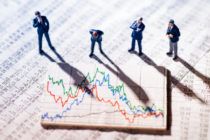Across the world growth remains modest, consumer spending is limited, savings are low and borrowing has soared. As the tenth anniversary of the global financial crisis approaches and markets move higher and higher, there is a definite feeling of unease in the air.
Wealth and fund managers know something bad is coming, we are of course well into the late part of the economic cycle in the developed world, but questions surround when, and how hard, a correction or recession will eventually hit.
Debt bubbles
Skerrits Wealth Management’s head of investment Andrew Merricks has revealed his concerns that bubbling debt levels are now an even bigger global burden than in 2008.
Total debt as a percentage of GDP in advanced economies was 274% in 2016 according to Merrick’s calculations, higher than the 219% it stood at in 2008.
In terms of portfolios, it has led Merricks and his team to approach equities with caution and treat any apparent ‘good news’ with suspicion.
“It’s a bit like driving at night across Beachy Head, off road and with no lights on. You know the danger is there; you’re not sure where the danger actually lies; but keep driving around for long enough and the likelihood is you’ll drive off the cliff eventually,” he said.
Bear view
Among the doomsayers is Albert Edwards, Societe Generale’s in-house permabear and strategist.
He said the Fed and Bank of England should “hang their heads in shame” for leading the globe towards what he believes is an “impending disaster”.
He points to a slump in household saving ratios to levels last seen in 2007 as a key indicator of trouble ahead, as well as the US corporate sector “borrowing binge”.
“I’m genuinely getting tired of bashing the major central banks, but every day more evidence mounts that almost exactly the same debt excesses that caused the global financial crisis in 2008, are present today,” Edwards said.
Consumer credit has boomed 6-7% for the last five years, above that seen in the run up to 2008, while QE has inflated corporate debt, he added.







